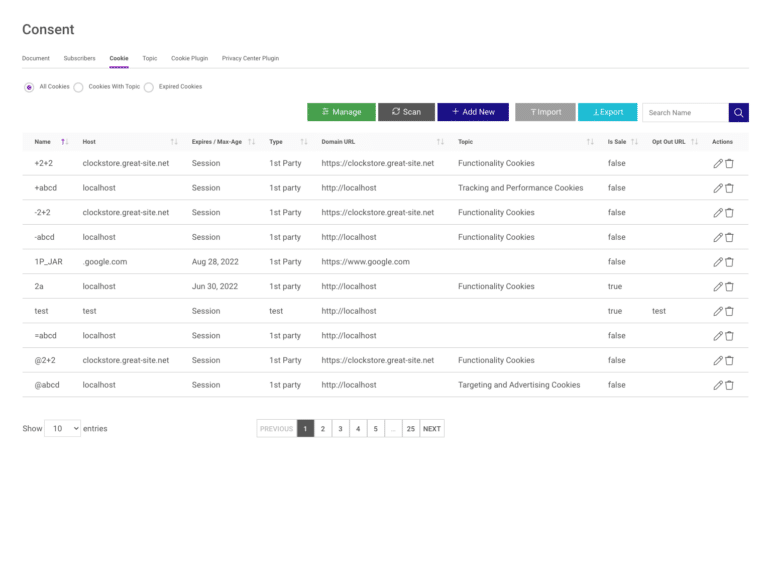
In this article, we review aspects of Cookie Consent Compliance in relation to data privacy in Australia.
The privacy act in Australia makes it necessary for every website to include a privacy policy that informs users about cookie consent options such as how the business collects and handles the personal information of their users.
Cookies
Cookies are small data inputs used to collect user data based on their activity on your website. Thus, disclosing within your cookie consent page regarding the collection and use of personal user data via cookies is necessary.
Privacy Act and Use of Cookies
Most websites use cookies to track and collect data. These cookies can be first-party or third-party, and a cookie consent website can have both. Cookies are necessary for a website to function correctly and for other analytical and marketing purposes. Therefore, your website must also abide by cookie compliance requirements to safeguard users’ privacy like any other website worldwide.
The privacy act of Australia and its principles make it necessary for any business website to have a privacy policy that includes details on all cookie consents for that website to collect, process, disclose, or utilise the user’s personal information. With the inclusion of hidden cookies and trackers within your website from third-party organizations, you become liable for any private data collection or use on your business website.
Different Types of Cookies
Cookies vary by their purpose. Here are three main types of cookies that are used by most websites.
Session cookies
Session cookies are those that remain for only that period when you are browsing that website. As soon as you close the window or log out from it, these cookies will expire too. Session cookies are deployed when web pages cannot remember individual users or their sessions. Without these cookies, a user would be required to log in every time they visited the website. The risk being that they will not revisit the website or it will make the browsing experience way more challenging for users. Suppose you are using an eCommerce website, and that site does not use session cookies. The items added to the cart will disappear every time you navigate another page.
Persistent cookies
These cookies are set to expire after a certain period compared to session cookies that expire with a window closing. However, this is a matter of concern since these cookies can remain on your browser for years if you are not removing them manually. They will continue tracking your activities and collecting data until they will expire.
Third-party cookies
Third-party cookies are the most undesired types of cookies due to their nature.
Whereas other cookies exist on the website you visit to make your navigation easier, third-party cookies come from other websites or servers that you probably do not even recognise while browsing a website. Suppose you visited an advertisement link on a website; when you visit another website with different services, you will probably see an advertisement link from that first site with third-party cookies.
These cookies give individuals a sense of insecurity since they show you results from your recent site visits, even on other websites.
The Use of a Cookie Consent Banner
The Internet contains thousands of websites, and you probably have noticed that almost every other website has a cookie consent banner. These cookie banners are most common among websites with a regular international audience. As you enter these websites, they ask you to consent to use cookies.
So, if you doubt the necessity of cookie banners for your site, you must first understand the following:
What Exactly are Cookie Consent Banners?
Every website that uses cookies showcases a pop-up banner every time you visit, asking for your consent to use cookies. Users are supposed to pick an option from that banner whether they want to accept the use of cookies, reject them, or want to select the use of only necessary cookies required for the website’s functionality. Mostly the requirement of cookie consent for a website is applicable for businesses with international audiences, as previously mentioned. It is due to the aspect that a website with an EU audience is required to adopt a cookie consent solution to comply with European Union (EU) law.
The European Union has established two laws for cookie consent policy:
The ePrivacy Directive
The General Data Protection Regular (GDPR)
The ePrivacy Directive makes it necessary to have the consent of the users for cookies that will collect their personal information and track their activities over the website.
The cookie consent banner GDPR or cookie consent GDPR will serve as inclusive data protection legislation that will implement strict laws on how a website will be eligible to ask for user consent for the use of cookies.
User consent is supposed to be earned via a clear and positive action on the user’s behalf. It eliminates any model that forces users to opt to provide their consent for using the website.
Suppose your website with international audiences fails to comply with the laws of cookie consent compliance. In that case, you will be fined with heavy penalties and lose the reputation and authenticity of your website.
Does Your Website Need a Cookie Consent Banner?
Australia’s Privacy Act 1988 and The Spam Act 2003 are the primary privacy laws implemented in Australia to secure users’ data. However, none of these laws have made it vital for websites to have a cookie consent banner. This is as long as they operate natively within Australia. You don’t need to employ a cookie compliance GDPR solution unless your website has an international audience. Thus, you won’t be breaking any laws even without a cookie policy banner implemented.
Still, the privacy policy act of Australia implies that the collected information using cookies may interfere with a user’s identity. Thus, Australian privacy law has made it necessary to disclose the use of cookies under the privacy policy page of a website.
As previously stated, when your website extends beyond borders, especially if it’s reaching the EU with its products and services, it implies the necessary use of a cookie consent banner to comply with the ePrivacy Directive and GDPR.
It might seem to be an unnecessary step however the existence of these banners is crucial. It protects users and their personal information from unauthorised use or disclosure.
Cookie consent compliance is necessary for Australia if you are looking to serve your customers both nationally and internationally.
Please refer to your legal counsel or seek legal advice for full interpretation of governing laws, acts and legislation.








